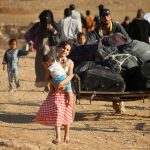The Supreme Court today began hearing oral arguments in a case debating the constitutionality of President Trump’s September 2017 Presidential Proclamation, the third version of his administration’s controversial travel ban. The outcome of the Court’s deliberations will have far-reaching consequences for asylum seekers, refugees, and other vulnerable immigrants: while the first two travel bans were temporary, this one could be permanent.
The case came about as a result of a challenge led by the state of Hawaii, which argued that the ban violates the Immigration and Nationality Act prohibition on discrimination based on race, sex, nationality, place of birth, or place of residence. Trump’s travel ban targets eight countries (Chad, Iran, Libya, North Korea, Somalia, Syria, Venezuela, and Yemen), representing some 180 million people, the majority of Muslim faith and background. The Supreme Court will also consider whether these travel restrictions represent a violation of the First Amendment.
Syria, among the affected countries, has been ravaged by war for the past seven years. Some 11 million civilians have been displaced by the violent conflict, many of whom feel that their last hope is asylum abroad.
Dr. Saeed* is a young surgeon from western Syria. After the conflict started in his country, he continued to perform surgery in the hospital where he worked, which is in an area controlled by opposition forces. After a local news report of Dr. Saeed operating was uploaded to YouTube, he was arrested, detained, and tortured for days. He was released on the condition that he only work in a government hospital. Not long afterwards, Dr. Saeed’s brother and a friend were both victims of targeted killings. He feared that he would be next, so he fled to the United States and applied for asylum. Little did he know that, in today’s America, he would not be easily welcomed due to the policy changes initiated by the new administration. His case in limbo, Dr. Saeed now spends his time volunteering in a surgery research unit in the northeast United States while completing the painstaking process of converting his Syrian medical credentials into ones that are recognized by U.S. institutions.
A forensic evaluator volunteering for Physicians for Human Rights (PHR) examined Dr. Saeed in order to assess the severity and nature of his trauma symptoms. She found that he presented a clinical picture consistent with his narrative of having been tortured, exhibiting symptoms of Post-Traumatic Stress Disorder and Major Depressive Disorder.
His predicament begs the question: if someone as threatened and endangered as Dr. Saeed is not welcome in America, then who is?
Only 11 Syrian refugees have been admitted into the United States in 2018, despite the horrific and illegal use of chemical weapons throughout the conflict and the intentional targeting of health care and civilians, documented on an ongoing basis by PHR. After years of living in refugee camps, most displaced Syrians who manage to validate their asylum claims wait indefinitely for possible future resettlement, even after undergoing extreme vetting. The travel ban allows for the possibility of a waiver if a denial would cause the applicant “undue hardship.” Yet, according to the State Department, despite more than 8,400 visa applications from the eight countries targeted by the ban, only 100 have been issued waivers, an approval rate of just over one percent. A record-low refugee quota, which stands at 45,000 for 2018, coupled with a travel ban with no real waiver option, represent a systematic policy change which endangers the right of those with legitimate claims to seek asylum.
Some in the United States fear that asylum seekers like Dr. Saeed may cause a threat to national security. This is, after all, part of the justification for the Trump administration’s ban. But the reality is that very few people seek asylum by choice. Most are forced from homes they love under extreme duress, and seek haven in lands far away because they have run out of other options to protect their lives and those of their families.
For many like Dr. Saeed, it makes no sense for the United States to emphatically denounce the indiscriminate killing of innocent civilians and then in the same breath to say that those civilians threaten U.S. national security. The Unites States has ratified the 1967 Protocol relating to the status of refugees and it is its legal responsibility to “act in concert in a true spirit of international cooperation” to respond to global refugee crises. Article 3 of the protocol strictly prohibits discrimination against refugees based on race, religion, or country of origin. Asylum seekers should be treated no differently.
Admitting only a handful of refugees from war-torn parts of the world like Syria each year, in the face of mounting violence, including chemical attacks, is tantamount to deserting a population in need.
*Name changed to protect identity.

